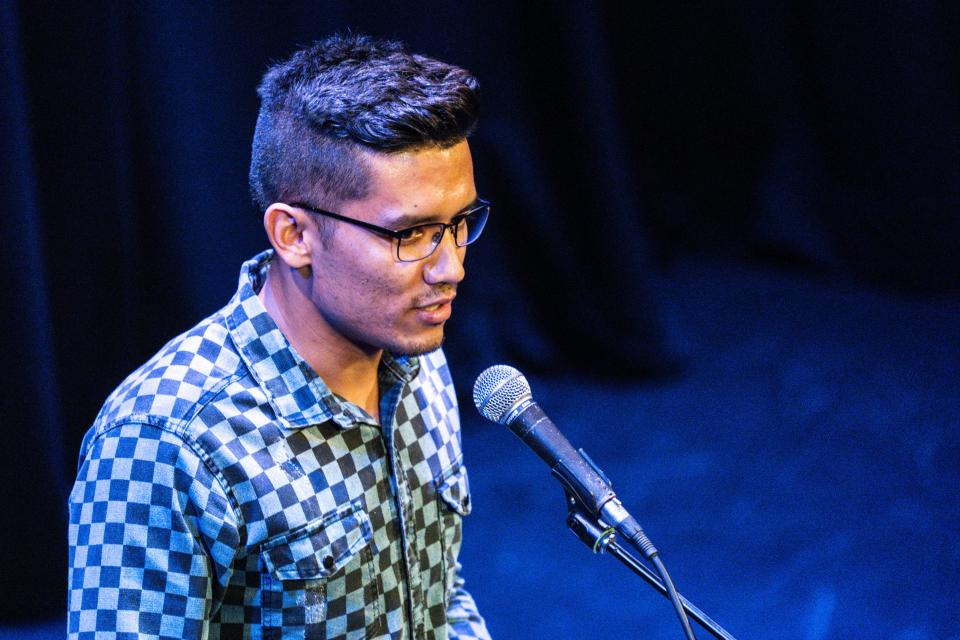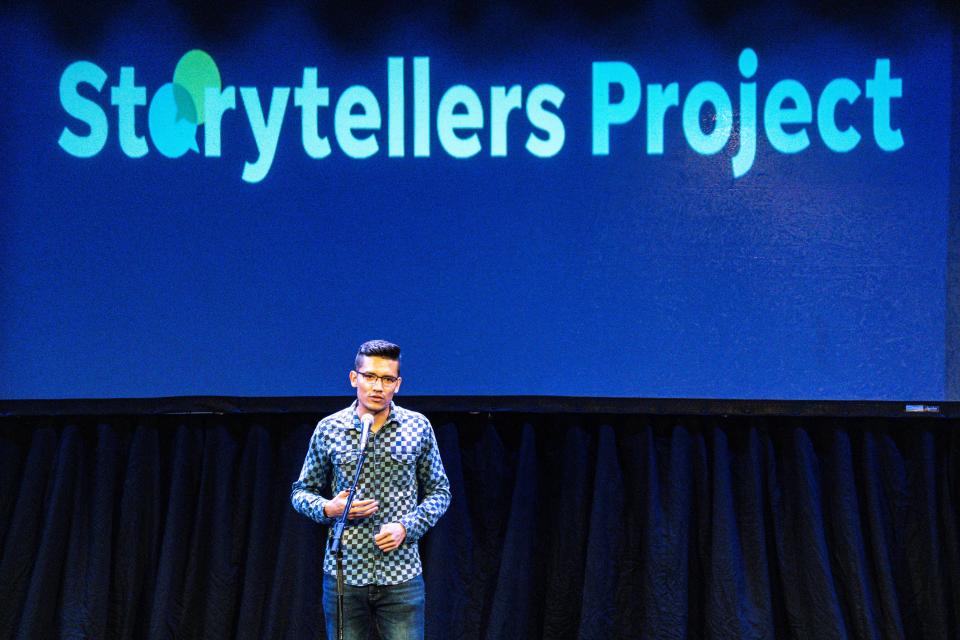I fled Afghanistan and came to the United States. Then I found a new family.
Editor's note: Ehsanullah Shaban first told this story on stage at the Des Moines Storytellers Project's "Family." The Des Moines Storytellers Project is a series of storytelling events in which community members work with Register journalists to tell true, first-person stories live on stage. An edited version appears below.
“I can pledge myself to pay for your education.”
I could always hear this sentence from my father when I was a child, showing me his commitment to supporting my studies. I felt that same commitment from my mother, who spent time practicing my school subjects with me when I was a child so that I could be the top student in class.
My father never broke that promise. As a result, I started attending English and art classes when I was a child. And I was the top student for my whole school term.
But imagine living in a country where they are trying to kill you just because of what you are. That was my reality growing up in Afghanistan.
We as Hazaras, an ethnic group, are facing social, civil and political discrimination and, worst of all, genocide.

As a Hazara in Afghanistan, I was in danger
For the last eight years, my mom said goodbye to us every morning with a throat full of lumps, worried we wouldn’t return home in the evening because they were targeting us with suicide bombing attacks, just because we were Hazara.
In July 2016 they targeted a Hazara demonstration about discrimination in Kabul and committed two fatal suicide bombing attacks against the demonstrators because they wanted justice. I lost two of my friends there.
On the 7th of August 2019, they bombed a police station in a Hazara area. I was a mile away from the explosion and the mirrors of our house and my father’s shop all broke. My father got injured when broken glasses hit his head.
But the one which I can never forget happened on the 2nd of November 2020 when they attacked our university.
It was my second year at Kabul University, and we were studying urban development. At that time, my goal was to become the minister of urban development one day. We were on class break and were playing football in the playground. It was around 10 in the morning when everyone started shouting, “Run! Run!” and people were running through the exit gate to save themselves. We were horrified and did not know what to do. I saw the death in front of my eyes.
In a moment I thought I would not survive because we were unarmed and defenseless. We were just students who wanted to learn. We were just playing on the playground with nothing but our notebooks, pens and a ball.
I was shocked. I did not know what to do. I knew the chance of surviving a suicide bombing attack was almost zero. I did not dare to run through the exit gate assuming that if the attackers were entering that gate, there would be no chance. Finally, I do not remember how, but I jumped over a 3-meter-tall wall to escape.
They entered our university and killed 32 students and wounded 50 others. I lost two more of my friends there. And I died that day 32 times for the students who had gotten killed in that attack.
I survived that day, but I was never the same person. I realized that that country is not a place to live anymore and also as the incident was very horrible, I promised to try to create a peaceful world where other people would never experience anything like that.
This is the normal situation in Afghanistan for Hazara people, living a life where there is no guarantee of your safety. Multiple other genocidal attacks happened, and it was totally normalized.

I was inspired to push for change. But I knew I had to leave Afghanistan.
One of the most cruel and horrible incidents happened on 30th September 2022: The attack on an educational center in Kabul at which 54 teenage girls got killed and more than 114 were wounded.
I could no longer sit and tolerate the violence. I felt like my soul had been torn out of my body and was on fire. The next day, I announced I was forming a nonprofit to help the victims. Not just for the victims, but to heal ourselves.
I went to the hospital to visit the injured victims and I cried, seeing them there. I spoke to their families to offer my condolences and told them that I would do my best in the future to offer any kind of help that I could. They needed money to pay for their medical bills and for food. I requested financial help on Facebook.
And that’s how I was introduced to the wonderful Sedina Traljesic, who lives here in Des Moines. Thanks to a mutual friend, Sedina saw my post and sent $1,000 for me to distribute among the victims.
But I knew I couldn’t stay in Afghanistan.
Two months later, I arrived in the U.S. on a student visa, as a result of my father’s supports and my mother’s efforts and attention to my studies, because it is not that easy for a student to come from Afghanistan.
My parents knew the conditions in Afghanistan were dangerous for me. Their first goal was for me to get out of the country to at least guarantee my life. They didn’t care where I went, as long as I was safe.
When I was alone in the U.S., I met a new family
Here in the United States, I first landed in Miami and enrolled in English classes at the University of Miami. I was really happy to come to a country where I was safe and protected, but soon I realized I was lonely. I felt totally alone, frustrated, and disappointed.
I knew almost no one in the United States — so I called Sedina. She, as always, was there to help. She told me to come to Des Moines. I spent six days in her sister’s home while she was on a trip. She did not even know that I was living there.
While I was staying there, Sedina posted about me on Facebook and asked if anyone could help.
That’s how I met the Kuburash family. They didn’t know me at all, but they knew how I was feeling. They had fled persecution in Bosnia decades ago, so they knew how it feels to be threatened and have to escape your country. And they understood the feeling of coming to a new city without knowing anyone.
More: 30 years apart, Bosnian, Afghan refugees fled persecution; now they've found family
I found a new father, Hasan Kuburash, and a new mother, Shuhra Kuburash, whose biggest concern was if I was full. They offered me food once an hour. It made the situation very wonderful for me, so that I got used to the new environment. I had a kind and praying father and mother who took me to their family parties and treated me as their son.
Yes, there were some cultural differences, but there is a language that does not need a translator — kindness.
Slowly, as I got familiar with the environment, I felt real freedom and safety for the first time after a very long time. I realized that no one was trying to kill me and that was amazing. I did not have the stress of getting killed because of who I was and that was a lot to me.
I lived with the Kuburashes for three months. These days I’m enrolled in classes at DMACC and living on campus. But I still talk to the Kuburashes on the phone and send them Facebook messages.
When I talk to my parents, back in Afghanistan, I tell them about the pressure I feel, how I’m still figuring out what to study and what my path is to succeed here. They tell me they believe in me and know I will choose the right path.
I hope someday they will be able to leave Afghanistan and come here.
I know that the learning that my parents encouraged me to do in my childhood helped me to get here, and I hope that the studies I do now will help me my whole life.
I’m grateful to my wonderful heroes, Sedina Traljesic and Hasan and Shuhra Kuburash, and their daughters, who are my new sisters. They made everything even more amazing and lovely.
When I was totally alone and frustrated, they gave me support, protection and care. They gave me the feeling of transferring from an old family to a new one.
ABOUT THE STORYTELLER: Ehsanullah Shaban is an avant-garde poet and a student at DMACC. He is obsessed with learning and adventure, believes in kindness and helping others and creating a peaceful world in which everyone has the right to an education and to pursue their dreams.

Become a teller
The Des Moines Storytellers Project strongly believes that everyone HAS a story and everyone CAN tell it. None of the storytellers who take our stage are professionals. They are your neighbors, friends or co-workers, and they are coached to tell by Register journalists.
Want to tell your story at one of our upcoming Storytellers Project events? Read our guidelines and submit a story at DesMoinesRegister.com/Tell.
Contact storytelling@dmreg.com for more information.
Hear past storytellers
WATCH: Mediacom rebroadcasts stories from the most recent show on MC22 periodically; check local listings for times. A replay is also available at YouTube.com/DMRegister.
LISTEN: Check out the Des Moines Storytellers Project podcast, which is available on your favorite podcasting platforms.
Your subscription makes work like this possible. Subscribe today at DesMoinesRegister.com/Deal.
This article originally appeared on Des Moines Register: A refugee fled Afghanistan to the U.S. An Iowa family took him in

